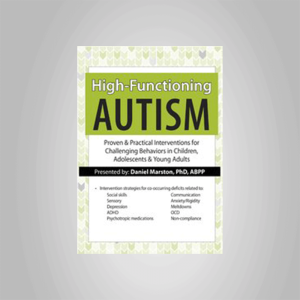Daniel J. Fox – Antisocial, Borderline, Narcissistic and Histrionic: Effective Treatment for Cluster B Personality DisordersDescriptionWatch national trainer, Dr. Daniel J. Fox, as he delivers an intensive workshop recording designed to provide you with the knowledge, skills, and abilities to accurately identify and treat your most difficult personality disordered clients. Better understand your clients with Antisocial, Narcissist, Histrionic and Borderline Personality Disorder client and make a breakthrough in clinical treatment.Manage the manipulative and possibly violent Antisocial Personality Disorder in session.Overcome the Narcissistic Personality Disorder trait of perfectionism and combat their need to overpower you as the therapist.Better understand your clients diagnosed with Histrionic Personality Disorder whose intense emotions and need for attention will test your patience and compassion.Help the Borderline Personality Disorder client deal with their explosive emotions, self-harm tendencies and cravings for chaos.Case studies and video examples will be used to illustrate client symptom presentation, treatment, and management of each Cluster B client type. You will explore various modalities that are effective with antisocial, narcissistic, histrionic, and borderline personality disorders, such as Motivational Interviewing, Cognitive-Behavioral, Interpersonal, and Dialectical therapies. Each of these theories will be explored to provide you with solid and useable skills to include in your daily practice.Stop being stuck and frustrated with your Cluster B Personality Disorder clients!HandoutsManual – Antisocial, Borderline, Narcissistic and Histrionic (3.82 MB) 83 Pages Available after PurchaseOutlineThe Personality MystiqueDSM-5® criteriaTreatment errors and misdiagnosesCore and/or surface structure and the role of the clinical disordersDifferential diagnosesFive central components to accurate diagnosisInsulate your clients against risk factorsAntisocial SpectrumOppositional defiance to psychopathAttachmentManage and avoid in-session violence and threatsSecondary gains, suicide attempts and threatsOvercome blockades – manipulation, threats, power struggles and moreSymptom presentation and risk analysis to self and otherInterpersonal theory techniques for complianceBalance transference and countertransferenceLessen destructive behaviorsCognitive-behavioral experiential techniques to lessen pathologyPsychotropic medicationsCase studies and treatment exercisesNarcissistic SpectrumNarcissistic presentation and the environmental contextAttachment and pathological narcissismTackle the veneer of perfectionismOvercome blockades – power struggle, absent empathy, excessive criticismThe narcissistic/borderline clientInterpersonal strategies for empathy engagementCBT techniques to clarify behaviors, values and goalsTactics to avoid arguingMotivational Interviewing to overcome resistancePrevent sabotageBuild a sense of true selfCase studies and treatment exercisesHistrionic SpectrumMoody to excited to histrionic: the erratic clientAttachmentCoquettish behavior, avoidance drama, inauthenticityDangers of the histrionic clientLink between emotions and behaviorInterpersonal strategies to encourage expression of true selfEnhance sense of self and lessen the “spotlightâ€Motivational Interviewing techniquesDBT techniquesInterpersonal strategies to build positive relationshipsStrengthen self-initiative and independent actionPsychotropic medicationsCase studies and treatment exercisesBorderline SpectrumSymptom presentation along the spectrumAttachmentFeeling identification and behavioral controlManage self-harm and suicidalityRage-ful outbursts, self-mutilation, boundary violationsCreate stability and build therapeutic collaborationDevelop true sense of self and lessen maladaptive need for attentionFacilitate pattern recognitionLessen the impact of maladaptive patternsUnderlying wishes and fearsBuild DBT core mindfulness skillsDBT techniques to dissolve the distraction and focus on the “genuine relationshipâ€Calm interpersonal upheavals with DBTDBT emotion regulation skillsPsychopharmacology and applicabilityCase studies and treatment exercisesFacultyDaniel J. Fox, Ph.D. Related seminars and products: 7DANIEL J. FOX, Ph.D., has been treating and specializing in the treatment and assessment of individuals with personality disorders for the last 14 years in the state and federal prison system, universities, and in private practice. He is a licensed psychologist in the state of Texas and has published several articles on personality, ethics, and neurofeedback. He is the author of The Clinician’s Guide to Diagnosis and Treatment of Personality Disorders (PESI, 2013), Antisocial, Borderline, Narcissistic and Histrionic Workbook (PESI, 2015) and Narcissistic Personality Disorder Toolbox (PESI, 2018). His specialty areas include personality disorders, ethics and emotional intelligence.Dr. Fox has been teaching and supervising students for the last 13 years at various universities across the country, some of which include West Virginia University, Texas A&M University, University of Houston, Sam Houston State University, and Florida State University. He is a staff psychologist at the Federal Detention Center in Houston, Texas, adjunct assistant professor at University of Houston, as well as maintaining a private practice that specializes in working with difficult clients. Dr. Fox has given numerous workshops and seminars on ethics and personality disorders, personality disorders and crime, emotional intelligence, managing mental health within the prison system and others.Speaker Disclosures:Financial: Daniel Fox is in private practice. He receives royalties as an author for PESI Publishing & Media. Dr. Fox receives a speaking honorarium from PESI, Inc.Non-financial: Daniel Fox has no relevant non-financial relationship to disclose.
 Daniel Marston – High-Functioning Autism: Proven & Practical Interventions for Challenging Behaviors in Children, Adolescents & Young Adults
₹5,810.00
Daniel Marston – High-Functioning Autism: Proven & Practical Interventions for Challenging Behaviors in Children, Adolescents & Young Adults
₹5,810.00
 David Burns – Treat Anxiety Fast: Powerful, Fast-Acting, Drug-Free Treatment Techniques that Defeat Anxiety & Worry
₹11,786.00
David Burns – Treat Anxiety Fast: Powerful, Fast-Acting, Drug-Free Treatment Techniques that Defeat Anxiety & Worry
₹11,786.00
Daniel J. Fox – Antisocial, Borderline, Narcissistic and Histrionic: Effective Treatment for Cluster B Personality Disorders
₹5,810.00






